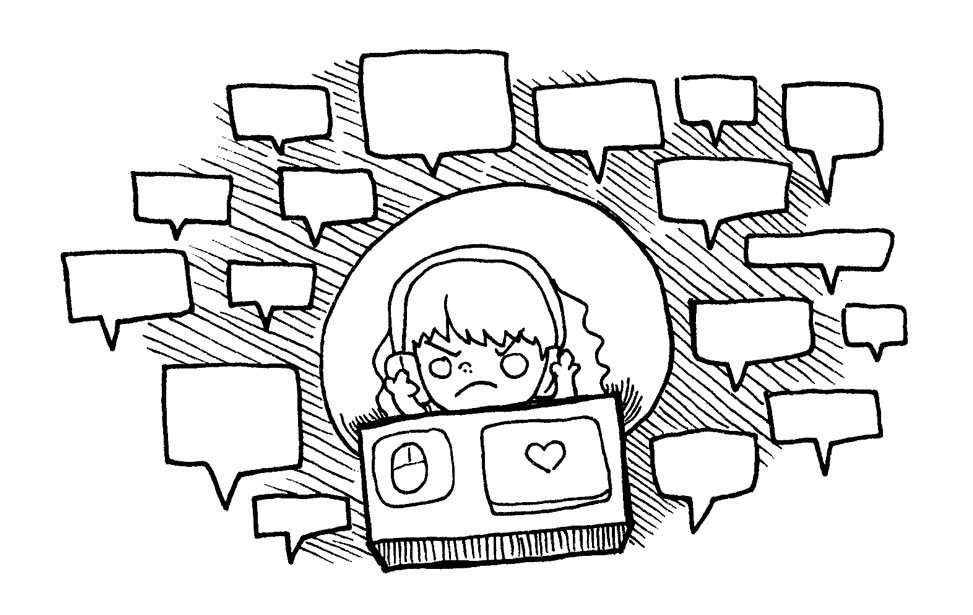Environmental UX for Introverts - Building a Creative Space for Less Social Designers

The environment in which you work strongly affects your ability to be creative and solve problems in innovative ways. This rings especially true for introverts, who begin to feel drained by overcommunication and overstimulation in loud, open places. In a society that encourages open office layouts and constant interaction, how can we help introverts find ways to be productive?
As an introverted product designer, I have long battled with noise generated by socializing in workplaces. I’ve been subjected to loud hourlong phone calls, rambunctious sales teams, bosses with a penchant for loud pranks, and more. I would attempt to zone out via loud music, but my playlists weren’t always enough. Eventually Pandora and Turntable no longer did the job, so I resorted to hiding in empty offices with tightly-shut doors. How many people resort to using spare rooms as refuge from noise? How many people suffer without an option to escape?
The percentage of introverted people in the world is estimated at about 30% - 50%. If you feel very comfortable by yourself and often find yourself seeking places to get work done without distractions from others, it is likely that you’re an introvert. Being introverted doesn’t mean you’re antisocial, but it does mean you work differently. After long bouts of socializing, most introverts need time to recharge because being with other people is physically and mentally taxing.
In one’s social life, introverts have more leeway to seek out necessary private space. Friends understand the phrase “I’m tired” and are quite forgiving. However, recharging isn’t something that qualifies as a sick day. If you’re an introvert with a job, you’re not getting time off when you feel drained, and you’re lucky if you get the chance to work from home. So, if we want this 30+% of the workforce to be more productive, how do we build spaces that work for them in addition to their extroverted counterparts?
- Build intentionally quiet spaces. A small room with a couch and a desk is a haven for people who crave introspection. Providing spaces that don’t require absence of a coworker to be of use will prevent resentment of others from brewing.
- Build intentionally loud spaces. A lounge or common area will draw workplace conversations away from others’ desks and encourage interaction without distracting those who are in the zone.
- Enable phone conversations to travel. Buy headsets for people who are in and out of calls so they can relocate to an isolated space when necessary. This will prevent others from becoming frustrated with the frequency of their coworker’s long phone calls.
- Allow and encourage working offsite (if possible). Some of the best work is done outside of the office – at places full of creative, introspective people. White noise websites like Coffitivity exist solely to provide a similar mindframe to the one that can achieved at cafés. Why not allow people to go to the real thing?
- Accept your differences. Introverted people are exhausted by too much social interaction. If they turn down a social event, it’s likely because they aren’t in a talkative mood. Peer pressure may lead to resentment, so it’s best respect their decision.
- Be aware of your presence. Your actions are important and impact others. Just like living with roommates, you have to be considerate of people’s space.
Introverts and extroverts are both human, and we should build places that promote both types of people to be productive.
Upcoming talks
-
Advancing Beyond Senior Roles: Navigating Non-Management Career Paths
This unique gathering is designed for professionals seeking pathways to growth that don't necessarily lead to traditional management roles. Led by Catt Small, this session invites attendees to share their experiences, challenges, and strategies in carving out impactful, non-managerial career trajectories. Engage in candid discussions about alternative leadership roles, lateral moves that enrich skills skill , and roles that expand influence without the traditional management responsibilities. This is a unique opportunity to connect with peers facing similar career crossroads, learn from the collective wisdom, and envision new trajectories for your career journey. Join us to redefine career success and discover new paths that align with your expertise and passions. Redefine career success with Catt and unlock new paths that resonate with your expertise and passions.
-
Moving from execution to strategy as a designer
Designers often find themselves under pressure to create beautiful outputs rather than impact and outcomes. In this talk, Catt Small will share techniques to move herself from execution to a more strategic role over 14 years of in-house work at companies spanning various industries. You’ll learn to add perspective to subjects including product strategy, growth, and monetization — showing the value of design at every part of the product development process. Before you know it, you’ll be your PM’s best work friend!
Want to talk?
Got feedback, looking to suggest a future writing topic, or want to invite me to speak at your organization? Send me a message and I'll get back to you as soon as possible!